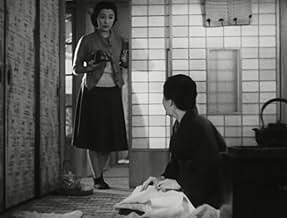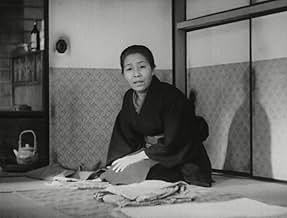Toda-ke no kyôdai
- 1941
- 1 घं 45 मि
IMDb रेटिंग
7.2/10
1.5 हज़ार
आपकी रेटिंग
अपनी भाषा में प्लॉट जोड़ेंWhen the patriarch of the Toda family suddenly dies, his widow discovers that he has left her with nothing but debt and married children who are unwilling to support her--except for her most... सभी पढ़ेंWhen the patriarch of the Toda family suddenly dies, his widow discovers that he has left her with nothing but debt and married children who are unwilling to support her--except for her most thoughtful son, just returned from China.When the patriarch of the Toda family suddenly dies, his widow discovers that he has left her with nothing but debt and married children who are unwilling to support her--except for her most thoughtful son, just returned from China.
- पुरस्कार
- कुल 1 जीत
फ़ीचर्ड समीक्षाएं
Ozu enters William Wyler terrain with a somber upscale family drama about a mother and daughter who are shuttled in unwelcome fashion from one family member's home to another following the death of the family patriarch. The thematic elements of displacement within a family unit anticipate TOKYO STORY -- there's even a bedtime scene between the mother and daughter that echoes one in the later film. There's a startling lack of music in this film, esp. during Ozu's normally music-filled transitional shots, that contribute to an overall sense of tense unease that touches on what might have been the general wartime state of mind among Japanese at that time. The war makes a subtle appearance in the form of the youngest son who offers to take the unwanted family members with him to settle in China -- a moment which might be aligned with Imperialist propaganda, though in a fascinating way: the Chinese "frontier" seems presented as a place where Japanese society can escape its social hypocrisies and begin anew.
When a respected businessman dies unexpectedly, his affairs turn out to be in disorder, and his sons sell off most of his goods quickly. His widow, Ayako Katsuragi, and her youngest, unmarried daughter, Mieko Takamine, become houseguests of their siblings.... but they show little filial love. Will Shin Saburi, the wastrel son, inspired by his father's death to go off to China and work hard, turn out to be this Japanese version of KING LEAR's Cordelia?
Ozu hadn't completed a film in four years. When he came back to the studios to make this, his style had shifted and settled. Now, although he still hung his studies of familial relationships on sturdy plots, he had settled on what would become his postwar trademark of long, still shots from a low perspective. There's clearly a bit of wartime propaganda in the movie, telling Japanese civilians that there's endless opportunity in China to get ahead without worrying about getting into those awkward situations of losing face.
Ozu would make another movie the following year, then not another until 1947.... first problems with Japanese censors, and then clearing his name with the American Occupation forces. However, here we see the mature Ozu. He was excellent. He would only get better.
Ozu hadn't completed a film in four years. When he came back to the studios to make this, his style had shifted and settled. Now, although he still hung his studies of familial relationships on sturdy plots, he had settled on what would become his postwar trademark of long, still shots from a low perspective. There's clearly a bit of wartime propaganda in the movie, telling Japanese civilians that there's endless opportunity in China to get ahead without worrying about getting into those awkward situations of losing face.
Ozu would make another movie the following year, then not another until 1947.... first problems with Japanese censors, and then clearing his name with the American Occupation forces. However, here we see the mature Ozu. He was excellent. He would only get better.
Todake No Kyodai wonderfully captures Japanese social mores in its most regrettable form. If you wouldn't know better, you'd think that the people inhabiting the various interiors (almost all of the movie takes place indoors) are mere acquaintances. Strong socio-specific communicative regulations pervade every conversation, every movement, every wink of the eye.
I don't know much about Japanese society, but the fact that the family's mother is given the cold shoulder (after the pater familias had deceased) stroke me as a critique against individualized (westernized?) modern Japan.
I would also like to mention a nice, though unintended effect the movie had on me: the copy has aged gracefully and at times provides cool hallucinating screen compositions and distorted rainfall sounds, which are welcome diversions from the otherwise monotonous goings-on in the still home environments.
I don't know much about Japanese society, but the fact that the family's mother is given the cold shoulder (after the pater familias had deceased) stroke me as a critique against individualized (westernized?) modern Japan.
I would also like to mention a nice, though unintended effect the movie had on me: the copy has aged gracefully and at times provides cool hallucinating screen compositions and distorted rainfall sounds, which are welcome diversions from the otherwise monotonous goings-on in the still home environments.
In this 1941 classic, we've seen the ever-existing traditional Japanese male chauvinism. All the men in this film never had to do anything, all the chores were done by the females, no matter they were grandmother, mother or daughter. The men just acted like spoiled kids, asking the women around them to fetch everything they needed. The women had to take back all the heavy chairs after a photo shooting. Men asked his wife to fetch his pants, husband asked his wife to bring a glass of water, make a phone call. All the men were like studs who only took the responsibilities to give sperms to their wives, making them pregnant, making them to be the fathers. They were bread makers. Once they were home after works, they just sat down and gave orders to the females at home to serve them. And the women also took for granted like maids, following all the orders given by their men. We've seen all the Japanese films from black and white since 1020 up to date in 2022, the 21st Century. We saw old Kiki Kirin doing all the chores at home while her son or daughter just sat around, didn't even bother to help her a little bit in all of her later films. I've never seen any male character in any Japanese film helping the females. The male chauvinism is just so astoundingly disgusting in every Japanese film.
As usual, you can expect a lot of visual purity from the Ozu movie. This has immaculate framing and great compositions. Except that you can experience the same impeccable cinematic style in any of his other 50 movies, and a better story to boot. I tried to immerse myself in this lineage tale of misunderstandings and family breakdown, but I couldn't help but find it stilted.
I admittedly understand that it is a completely foreign culture to begin with, and a culture of Imperial Japan to boot. Be that as it may, the way the script portrays the supposed disrespect the eldest sister exhibits to the mother is the most spurious domestic argument imaginable, where it is simply impossible for me to gauge "the big deal," so to speak. Have Japanese families lived in perfect harmony before the turn of the century and the Meiji era? Have they never kept information from each other or had misunderstandings about how they should all act when the guests come over? Was there seriously no better way of demonstrating that they didn't want the pair there beyond this plastic irritability with a mother and younger sister melodramatically kneeling in front of the portrait of the late patriarch? Oh, those were better times, indeed. Or were they? Beyond the group photo scene, there wasn't even a good impression of how he ruled the family except for the debts that he left them.
Ultimately, of course, the emancipator son, who, without even knowing what happened, immediately assumes they were forced out and condemned to the villa. The cabin that they say is dilapidated and that they won't even sell seeing it is that bad. Which is an even more dishonest statement than the arguments. Looks cozy to me. Just the same, he rescues them and takes them to Tianjin. Good for them. They'll get in on the ground floor in China. 1941 is just about time.
I admittedly understand that it is a completely foreign culture to begin with, and a culture of Imperial Japan to boot. Be that as it may, the way the script portrays the supposed disrespect the eldest sister exhibits to the mother is the most spurious domestic argument imaginable, where it is simply impossible for me to gauge "the big deal," so to speak. Have Japanese families lived in perfect harmony before the turn of the century and the Meiji era? Have they never kept information from each other or had misunderstandings about how they should all act when the guests come over? Was there seriously no better way of demonstrating that they didn't want the pair there beyond this plastic irritability with a mother and younger sister melodramatically kneeling in front of the portrait of the late patriarch? Oh, those were better times, indeed. Or were they? Beyond the group photo scene, there wasn't even a good impression of how he ruled the family except for the debts that he left them.
Ultimately, of course, the emancipator son, who, without even knowing what happened, immediately assumes they were forced out and condemned to the villa. The cabin that they say is dilapidated and that they won't even sell seeing it is that bad. Which is an even more dishonest statement than the arguments. Looks cozy to me. Just the same, he rescues them and takes them to Tianjin. Good for them. They'll get in on the ground floor in China. 1941 is just about time.
क्या आपको पता है
- ट्रिवियाThere has been speculation that Ozu's direction of this film related to his own family's situation where his sister-in-law (married to his older brother) and mother did not get along.
- कनेक्शनReferenced in Bandoui bom (1941)
टॉप पसंद
रेटिंग देने के लिए साइन-इन करें और वैयक्तिकृत सुझावों के लिए वॉचलिस्ट करें
- How long is The Brothers and Sisters of the Toda Family?Alexa द्वारा संचालित
विवरण
- रिलीज़ की तारीख़
- कंट्री ऑफ़ ओरिजिन
- भाषा
- इस रूप में भी जाना जाता है
- The Brothers and Sisters of the Toda Family
- फ़िल्माने की जगहें
- उत्पादन कंपनी
- IMDbPro पर और कंपनी क्रेडिट देखें
- चलने की अवधि
- 1 घं 45 मि(105 min)
- रंग
- ध्वनि मिश्रण
- पक्ष अनुपात
- 1.37 : 1
इस पेज में योगदान दें
किसी बदलाव का सुझाव दें या अनुपलब्ध कॉन्टेंट जोड़ें






























